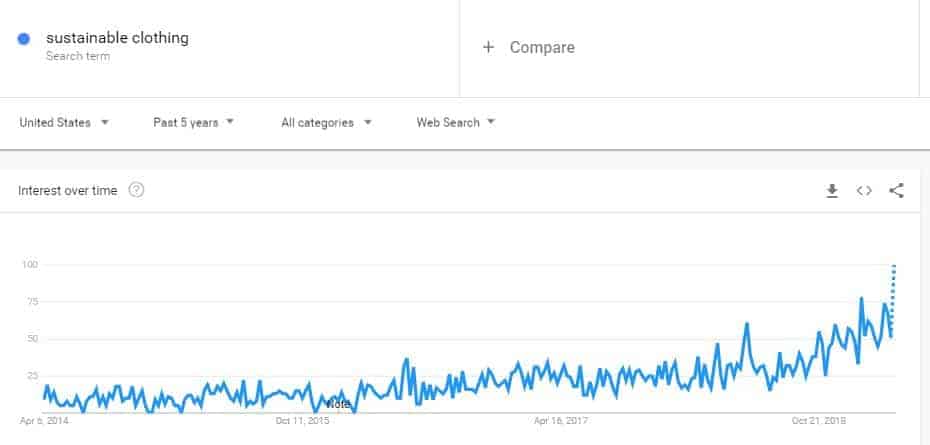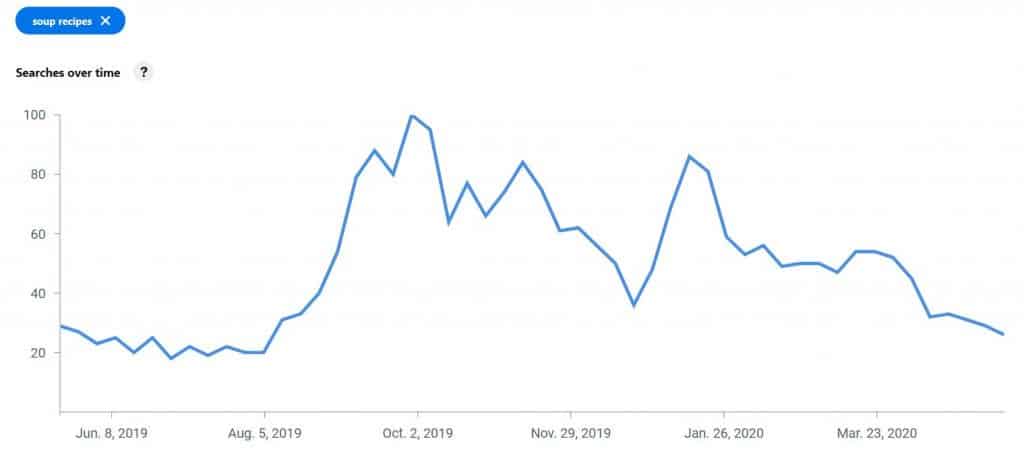Last Updated on
You have a passion for writing and entrepreneurship and have a million ideas about what life will look like once your blog takes off, but first, you need to ask yourself an important question:
“What should I blog about?”
As you sit to try and figure out that perfect topic, you slowly begin to feel overwhelmed with all the things you can start a blog on.
Sound familiar?
All bloggers face this predicament when they try to start a profitable blog. It can be difficult to try and find unique blog ideas that suit your interests AND make you money.
But I like to think there’s an easy way to figure out what you should blog about, and I’m going to share that with you today.
Now, if you know anything about me, it’s that I’m an analytical person. I choose my moves wisely and I like to make informed decisions.
After all, blogging is a business, and when you are picking a blog topic, you need to do some work before jumping straight in.
Especially if you want your blog to make money.
So, I’m not only going to give you tips on how you can find popular blog topics, I’m going to show you how you can analyze those topics to be sure they’ll be profitable.
Let’s dive right into the steps you need to take if you want to uncover what you should blog about.
How to Find What You Should Blog About
Your first step to uncovering what you should blog about is by coming up with some ideas. Here are five different ways that you can do that.
1. Write What You Like
We’ll start here because, in my opinion, it’s the easiest way for you to find what you should blog about.
Starting a blog about something you are already passionate about is going to make the content creation process a whole lot easier.
Try and think about your current passions right now. Is there something you’re interested in that you’d absolutely love to share with the world?
If there is, start with that!
Now, if you’re sitting here thinking, “do I need to write about something I’m passionate about?”
The answer is no. And here’s why.
You don’t need to be in love with the topic you are writing about (although it can certainly help). You do, however, need to be able to write a crapload of content about it.
You should always ask yourself:
“Do I love this topic enough to write tons of article on it?“
If the answer to that question is “yes” then you’re good to go.
2. Write About Something You Want to Learn About
A major misconception about blogging is that you need to be a total expert to write about a topic.
Learning as you go is perfectly acceptable, in certain situations.
Blogging is often one part writing and four parts researching. If you can research something, you can blog about it.
But if you plan to choose a topic and “learn as you go” you’ll want to read this part carefully, otherwise you could back yourself into a corner.
One way you’ll likely want to get traffic to your blog is from search engines, like Google.
Google’s a great source of traffic for myself and many other bloggers.
But Google is selective on what websites it puts on the first page of search results to send traffic to.
Google uses an acronym, E.A.T, to rank certain content. E.A.T stands for:
- expertise
- authority
- trust
Websites that fall into specific categories (which I’ll talk about shortly) must have E.A.T, otherwise, Google won’t want to rank them high.
Generally, those categories are Y.M.Y.L (yes, more acrynoyms), which stands for: Your Money or Your Life.
Websites that fall under these categories need to have content written by writers who have expertise and authority in the area and are a trusted source (hence, where E.A.T comes from).
Some common examples of Y.M.Y.L are:
- finance blogs
- fitness blogs
- health blogs
- mental health blogs
So, if you want to learn more about finance, I don’t recommend starting up a finance blog because Google isn’t going to want to send you traffic.
Now, if you’re a stock broker and you know a thing or two about finance, not a problem. Google just wants to make sure that people are taking advice from reputable sources when it concerns their lives and their mula.
However, if you want to start up a blog about pickling garlic, go for it. Google doesn’t need your E.A.T for that!
3. Write About Something You’re an Expert In
That brings us nicely to my next point: write about something you’re an expert in! Especially if it falls under one of the Y.M.Y.L categories.
Writing about a topic you’re an expert in can be incredibly easy because it will require little research on your behalf since you already know a great deal about the topic.
If you’re strapped for time and don’t think you’ll want to spend hours researching new information, consider blogging about something you already feel comfortable with.
4. Consider The Types of Blogs You Frequent
If you already read lots of blogs, think about which ones you like, why you like them and how they can be improved.
Since you’re already familiar with them, it will be easier for you to uncover gaps in their content that you could potentially fill with your own blog.
Chances are, if you think their content is missing something important, so do other readers.
5. Take a Quiz
If you’re still unsure and need more help coming up with blog ideas, take my “what should I blog about quiz” (and yes, that’s the best name I could come up with…).
Don’t worry, I don’t ask for your email in order for you to view your results, so you can be on your merry little way after you take the quiz!
How to Tell if People are Interested in Your Topic
I’m guessing you want to start writing because you’d like to share something with people.
Before you get married to your topic idea, let’s see if there’s actually any interest in it.
An easy way to gauge the interest level in a particular topic is to use Google Trends.
When you go to Google Trends, plug your idea in and see what the graph looks like.
Is it trending downwards? If that’s the case, it means your idea is losing momentum and popularity. It might not be the best topic for you to write on.
However, if it’s growing in popularity or remaining stable, it could be an excellent blog topic.

Here’s the trend report over the last five years for the search term “sustainable clothing”. We can see that it’s growing in popularity and, therefore, would make a popular blog topic.
Pinterest Trends is also another tool you can use to gauge interest in a topic over the course of a year.
And if you thought Pinterst was just for pinning your crafting recipes to, think again! Pinterest is a search engine, just like Google, and has the potential to send you thousands of visitors each month to your website.
But Pinterest Trends can also help you understand seasonlities within your topic (if there are any).

In the above screenshot for the search term “soup recipes”, we can see that it spikes around September and slowly tapers off in the Spring and Summer months.
Knowing about the seasonalities on your topic can help you plan for those low traffic months when your audience might not be searching for your blog posts, and fill those months with other complementary topics that have high search volumes.
How to Tell if Your Topic Will be Profitable
This step is incredibly important.
Unless you don’t want to make money blogging or turn your blog into a business.
If that’s you, then you don’t need to worry about this step as much.
However, if starting a profitable blog is on your radar, you can’t skip this step.
Certain types of blogs make money and others are harder to monetize. Confirming that your blog niche can turn a profit is essential.
There’s no sure way to know whether or not you’ll be able to make money in your niche, but there are a few things you can do to increase that chance.
1. Check Out Your Competition
Looking to your competition can be a good indication as to whether or not your niche is going to be profitable.
While there’s no surefire way to know if your competition is making lots of money, there are a few things that can help you.
Ads
Ads are a source of income. 99% of websites can put up ads, however, so it’s not the strongest indication that they are earning an income.
Ad management companies such as Mediavine and AdThrive require a threshold of pageviews in order to be considered to join their programs.
Usually, you’ll be able to tell which ad management company a blog is with by looking at their footer:

Online Shop
An online shop can also be a good indicator that the niche is profitable. The products in your competitors’ shops can be virtual or physical.
Affiliates
One way to make money blogging is through affiliate marketing.
Affiliate marketing is the process of earning a commission when you promote a product. As an affiliate, you’ll receive a unique link for the products you’d like to promote. This link is able to track traffic and sales and will pay you a commission whenever a sale is made.
Do they have affiliate links in their blog posts? You can easily find out by searching for “affiliate” within their website. Blog posts that mention affiliate products should have some form of disclosure, where they state that they are an affiliate.
If you search for “affiliate” you’ll be able to pull up all the blog posts with that disclosure, so you can see what types of products they are promoting.
Income Reports
Lots of bloggers also put together income reports. This is an incredibly helpful way to get a peek into the possibility of monetizing your blog.
To look for income reports in your niche, Google “YOUR NICHE” + “income report*”.
For example, if you want to write about cars, you can search for, “cars + income report*” or “auto + income report*”.
If you try this a few times, you’ll be able to access tons of great information.
Income reports also paint a roadmap for how that certain blog is monetized…use them to your advantage.
2. Look at Affiliate Programs
There are many different affiliate programs for bloggers, and it’s good practice to go through those programs and make sure they’d be a good fit for your future blog.
Here are some affiliate programs to get you started:
You can also reach out to companies directly to see if they have an affiliate program in place.
3. Sponsored Content
Writing sponsored blog posts can be a lucrative way to earn money from your blog.
Sponsored posts are when you are getting paid to write about and review a brand’s products or services.
Sponsored posts on a high-traffic blog can earn you upwards of $1,000 per post.
You can quickly see if bloggers in your niche are writing sponsored content by searching for “YOUR NICHE + “opinions are my own”” OR “YOUR NICHE + “sponsored by””.
For example, your search might look like this:
- fitness + “opinions are my own”
- fitness + “sponsored by”
These phrases are common in sponsored content, so you’ll be able to get a quick idea of what companies are working with bloggers.
Can Your Write About Multiple Topics?
Many new bloggers want to have a large blog topic list and write on a ton of different topics. For example, there are lots of popular blogs that fall under the lifestyle blog category. The term “lifestyle blogging” encompasses many different blogging topics, although even then, most lifestyle blogs still have a defined focus.
It’s fine to write about a few different topics as long as they fall within the same niche and tend to have the same audience.
Niched-down blogs tend to do better because they have a higher click-through rate and here’s why.
Let’s say you’re trying to learn about fitness, so you search for “beginner workout activities” and click to the first search result you find.
As you’re reading, you also notice that the blog includes healthy recipes. Since you’re interested in fitness, you also might be interested in clean eating, so you decide to click on some of the recipes and read those.
These two topics complement one another and as a result, can increase the number of pageviews one user has.
More pageviews = more income.
However, let’s pretend when you land on the article for “beginner workout activities” you notice that the blog you’re on talks about home decor ideas.
These two topics don’t complement one another, and rather than click onto the home decor blog posts, you’ll probably hit the back button and try to find a blog that suits your needs.
So when you have a blog that is disjointed in what you are writing about, you’re hurting your chance at increasing profits.
In Conclusion
You ended up here because you asked the question, “what should I blog about?” While it can be a difficult and daunting task when you are just starting out, the above strategies will help you form a blog topic list that will be popular as well as profitable.
Pin me:

This article may include affiliate links. As an Amazon Associate I earn from qualifying purchases.

Dana Nicole is an award-winning freelance writer for MarTech/SaaS who was rated one of the best SaaS writers by Software World. She specializes in writing engaging content that ranks high in search engines and has been featured in publications like Semrush, ConvertKit, and Hotjar.
Dana holds a Bachelor’s degree in Business Administration and has over 15 years of experience working alongside national brands in their marketing departments.
When Dana’s not working, you can find her dancing en pointe, cooking up new recipes, and exploring the great outdoors with her two big dogs.


Hey, thanks for a great post, it seems everyone these days is trying to make a little extra on the side but it is so hard to find really good blogs like yours.